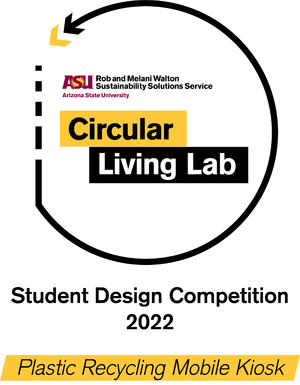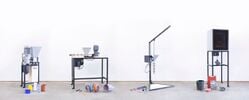
The Rob and Melani Walton Sustainability Solutions Service (RMWSS) is calling on students to help develop a mobile plastic processing education kiosk. RMWSSS's Circular Living Lab (CLL) was created to research and apply material recycling solutions to communities in need. The CLL plastic microfactory utilizes a suite of semi-industrial plastic processing machines to accomplish these tasks at a university level. However, the CLL now needs a mobile educational kiosk to display fundamentals of plastic recycling that can be utilized in schools, community fairs, and public events.
This competition is primarily one of conceptualization and design. The winning team will receive access to up to $10,000 in parts/materials to actualize their design during Summer 2022.
Competition Details[edit | edit source]
Timeline[edit | edit source]
The competition will run during session B of the Spring 2022 academic calendar (March 14 - April 29) with a winner being announced by May 6th. The competition is broken into two phases with a design/progress review half way through the competition. See deliverables.
Phase 1 March 14 - April 8
Phase 2 April 9 - April 29
Team Structure & Registration[edit | edit source]
Teams are limited to five current degree-seeking ASU students. Teams must have at least 1 undergraduate. Students can be from any school and multidisciplinarity is encouraged.
To register as a participating team, please designate a team lead and have them email tyler.eglen@asu.edu with a list of:
- Team Name
- Team member names
- Year of study
- Major or degree
- Student ID#
Please include the subject line: RMWSSS COMPETITION REGISTRATION
Constraints[edit | edit source]
- All designs must include versions of the following machine components:
- Precious Plastic Shredder
- Precious Plastic Extruder
- Precious Plastic Injection Machine
- Precious Plastic Compression Machine
- What do you mean "versions"? Each of the guides linked above are starting points. The winning team will be supplied with all the required components to make the above machines as listed. However, if part of your design is to enhance or modify one of the above machines, you are encouraged to do so. However the base functionality of the machine must stay intact. See judging criteria below.
- What do you mean "versions"? Each of the guides linked above are starting points. The winning team will be supplied with all the required components to make the above machines as listed. However, if part of your design is to enhance or modify one of the above machines, you are encouraged to do so. However the base functionality of the machine must stay intact. See judging criteria below.
- All designs must be housed in one central transportable unit, that can be moved under human power alone.
- The unit must be "road" transportable using a single consumer level truck/vehicle. (no Uhauls or shipping trucks)
- The unit must be operable using no more than standard 120v (~15A) single phase power.
- No two machines are required to operate at the same time.
- The unit must take human-centered design concepts into consideration.
- The unit must be as accessible as possible to users of varying physical ability and stature (kid-friendly).
- The unit must present no undue risk of harm to its operators or spectators.
- Special consideration will be made for:
- burns
- electrocution
- cutting/crushing hazards
- Special consideration will be made for:
- The unit must remain under open-source licensing. Attribution-ShareAlike
- Teams will be judged based on their deliverables as they are measured against the judging criteria described below.
Resources[edit | edit source]
The competition organizers have gathered a team of professionals with expertise in multiple fields to assist the teams as needed. The teams may post questions to the competition page on Appropedia for open ended questions that may benefit all teams. Additionally you may reach out to the competition organizer Tyler Eglen for individual questions.
Build Guides[edit | edit source]
As noted in the constraints section, your finished design must include the four functional machines listed above. Build guides and 3d models for all of these machines are already available from precious plastic and can be accessed through the shared drive here. It is recommended that you start here with your design.
Go to Folder "3. Build" --> select a machine --> select cad files --> download the step file --> load it into your preferred CAD software.
The Precious Plastic folders also contain Bill of Materials (BOM) documents for your reference. The winning team will be provided with all equivalent parts from these BOM as required to actualize their final design. Any additional parts should be documented as described in deliverables/judging criteria below.
Deliverables[edit | edit source]
Phase 1 March 21-April 13 (EXTENDED DEADLINE)[edit | edit source]
At the end of phase one, your team will be responsible for submitting a preliminary design review. This will consist of a 5-8 minute presentation that highlights your design solutions. See Judging Criteria. You are not expected to have a finished design yet, but you must show progress towards the final criteria.
You will receive feedback from the judging panel with questions, comments, and concerns about your current progress.
Phase 2 April 13 - May 4th (EXTENDED DEADLINE)[edit | edit source]
After receiving feedback from round 1 your team will use the remaining three weeks to incorporate the judges comments into your final design solutions. Final design submissions should include:
- A 3D model of the mobile unit including all 4 Precious Plastic machines.
- A BOM for additional parts needed to construct the unit beyond those already provided in Precious Plastic documentation
- A 5-8 minute presentation highlighting design considerations that meet judging criteria (listed below).
- Another way to think of this is that this presentation is your "pitch" for a funding application. Sell the judges on your specific solution.
All deliverables should be submitted as a new sub-page here on Appropedia.
Judging Criteria[edit | edit source]
Innovation
- Does the submitted design have new innovations that add functionality beyond the basic requirements? Innovations of particular interest include:
- Alternative power sources (human powered, solar powered, battery, etc.)
- Automation - Can certain tasks be automated to require less human input?
- Data tracking - Can operations be tracked and monitored (quantities of plastic processed, power consumed, motor speed, compression pressure, etc.)
- Connectivity - Can units be controlled via smart-phone or computer? Can geolocation information be shared to the public?
Efficiency
- How well does the design utilize space and layout?
- How well does the design utilize power consumption?
- How well does the design limit extraneous operations?
- Where does the design streamline the recycling process?
Aesthetics
- How well does the unit tell the story of plastic processing?
- How does the unit incorporate aesthetic consistency?
- How does the design produce joy and inspire participation?
Operability
- How does the design incorporate human-centered design?
- What safety measures have been utilized?
- How does the unit enhance its operator's ability to educate others?
Documentation
- Does the project have detailed documentation with the intent of sharing?
- Have the designers maximized reach by creating instructions, videos, 3d models, or supplementary information?
Award Information[edit | edit source]
A panel of expert ASU Faculty and Staff will serve as the judging board and determine which design will be selected for fabrication. The winning team will be notified of their selection by May 6th, 2022.
The winning team will then be invited to consultation meetings to begin kiosk fabrication. Teams will be able allocated up to $10,000 to purchase parts for their design. All parts to construct the four Precious Plastic machines will be taken from this sum. Students will have access to tools and workspace on the Polytechnic campus during normal business hours. The final unit, including all purchased parts, will remain property of ASU. The unit will be utilized both on ASU campus and at local site visits to educate the community on plastic recycling. All students who competed on a design team will be given access to the finished unit to pursue individual academic interests. It is the competition organizers' hope that the finished unit will remain an active part of the ASU sustainability for years to come.
